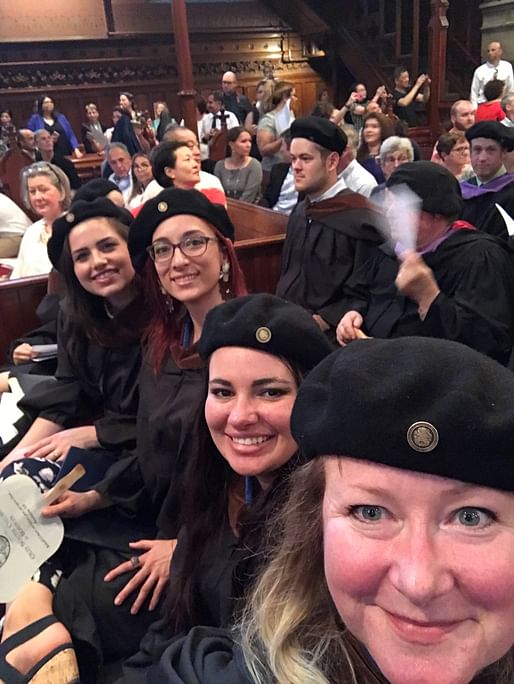
“I give back because the BAC changed my life,” Janet Roche, MDS-DHH’17, said plainly. The Alumni Advisory Council Chair is on a mission to pass it forward to other BAC graduates. “I want to help create a network that is a place for all BAC graduates to return, find help and mentors, share resources, and keep in touch with faculty. It’s where you can find the people who will have your back.”
Janet, who studied social work at Boston University as an undergraduate and worked with incarcerated youth before founding a video production company, came to the BAC in her forties.

From right to left, Janet Roche, Chloe Hendricks, Karina Rodriguez-Winkler, and Adrienne (Jones) Erdman – all part of the MDS-DHH Class of 2017 during Commencement in the Old South Church on May 19, 2017.
When she switched career tracks to join the design industry, Janet refused to focus on luxury interiors. An innate changemaker, she was amongst the first cohort of students to enroll in the Master of Design Studies in Design for Human Healthprogram. She explains, “As a student at the BAC, I realized that health, wellness, and inclusive universal design were the way of the future.”
Living out a commitment to social justice by designing for the most marginalized populations remains Janet’s motivating purpose. Today, she is the principal of her own firm, Janet Roche Designs, focusing on finding real life solutions that significantly improve the homes of those with health conditions or allow people to age in place comfortably.
“This is not about installing a couple of grab bars and calling it a day,” she quips. “For example, if someone has dementia, there are at least forty things you need to do in their kitchen alone to keep them safe and prepared.” And many of these solutions are not only functional and create more independence but are also attractive.
Janet’s commitment to the BAC is so strong that she’s never left. Immediately after graduating in 2017, she became an adjunct instructor for courses including Health Conditions & Design, Environmental Health, and Biophilia (designing to promote the human connection to nature).
She said, “One of my favorite things to do is to take students around the hugely populated areas near Mass Ave and show them the sorts of problems that Boston has when it comes to accessibility.”
In a practical exercise, she runs classes through a series of activities including, one student sitting in a borrowed wheelchair, while others observe as they simulate everyday tasks like boarding the "T", accessing a public bathroom stall, or just ordering a coffee. Simple activities are either impossible or take a frustratingly long time due to a lack of thought in the surrounding built environment.
After each iteration, the students leave class deeply impacted. That’s Janet’s goal.
“I have high hopes for this next generation of BAC graduates,” she said. “They have more empathy. They think about other people, see that things aren’t equal, and they want designers to be more aware of differences.”
It’s raising this awareness that propelled Janet to lean on her previous production skills to launch the Inclusive Designers Podcast, a collaborative ideas-based show now in its fourth season. Episodes have included an interview with the late pioneering disability rights activist Judy Heumann, a three-part series on behavioral health with Meredith Banasiak, and a conversation with BAC Trustee Valerie Fletcher on designing for the changing reality of disability in America.
Janet Roche, MDS-DHH'17, recording her very first podcast, Inclusive Designers, in the studio in September 2019.
Early in the pandemic, when the reality hit home for more Americans of how health could be taken away in a single fragile breath, Janet co-founded the Trauma-Informed Design Society (TiDS) together with Christine Cowart, a Trauma-informed Care consultant, and Dr. J. Davis Harte, who is the Director of the Design for Human Health MDS program at the BAC. Dr. Harte and Janet had been discussing these new concepts within design for a couple of years and decided it was time to start formalizing the ideas, and principles around trauma-informed care to share with designers worldwide. Thus, TiDS focuses on furthering design processes for the built environment based on trauma-informed care principles. All decisions about the physical environment are filtered through the overlapping lenses of environmental psychology, neuroscience, physiology, and cultural factors. The intent is to create uniquely-designed, stress-mitigating spaces where all users feel safe.
In 2022, a grant from the American Society of Interior Design (ASID) Foundation funded the Trauma-Informed Design Society, to create an evidence-based, trauma-informed tool to facilitate interior design renovations and new builds of K-12 schools. The Trauma-informed Design Evaluation Tool for K-12 Schools (TiDEvalK12) is grounded in the Substance and Mental Health Services Administrations' (SAMHSA) guidance for a trauma-informed approach, the Trauma-informed Design (TiD) Society's own framework, and feedback from almost 100 educators, school administrators, and designers across the country.
Janet said, “Moving forward, we are really hopeful about working with the Society and the BAC to get additional grants, offer students opportunities to research, and also support graduates with trauma-informed design interests.”
This May, as more than 150 BAC graduates walk across the stage to claim their diplomas, a new cohort will join the College’s alumni network. “This is our community,” Janet wants to remind them. “You can come back five or ten years from now and we will still be here to support you and help you find ways to give back as well.”
The #BACbuzz blog will help to inform, educate, and share relevant and noteworthy architectural and design news happening within the Boston Architectural College and around the Boston community.
No Comments
Block this user
Are you sure you want to block this user and hide all related comments throughout the site?
Archinect
This is your first comment on Archinect. Your comment will be visible once approved.